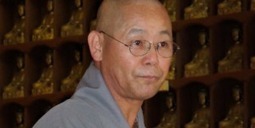Resident is first American-born bishop of American-Europe Parish
By Chris Jackett
C & G Staff Writer
» click to enlarge «

Photo by Donna Agusti
Venerable Jong Mae Park, left, conducts a Buddhist induction ceremony for, from left, Venerable Hae In Lissabet, Venerable Hae Kwang Gallop and Bishop Hae Doh Gary Schwocho Feb. 2 at Muddy Water Zen in Royal Oak. After eight years in the role, Park was turning over his bishop duties to Schwocho, a Royal Oak resident.
Photo by Donna Agusti
From left, Venerable Hae In Lissabet, Venerable Hae Kwang Gallop and Bishop Hae Doh Gary Schwocho reflect during a Feb. 2 Buddhist induction ceremony at Muddy Water Zen in Royal Oak.
|
ROYAL OAK — Perhaps one of the city’s most well-kept secrets is that it hosts one of the nation’s largest Korean Buddhist Taego Order temples, which has produced the first-ever American-born bishop of the American-Europe Parish this past weekend.
Venerable Hae Doh Gary Schwocho, 66, was ordained for a four-year term as the Buddhist bishop Feb. 2 at Muddy Water Zen, 2421 Yale Ave. As the leader of the collective parishes outside of Korea, Schwocho will oversee the Taego Order clergy for the U.S., Europe and Canada while also managing the internal directions and growth of the group’s sangha (religious community) as their spiritual leader. He will establish policy, education and practice, and lead clergy retreats and ongoing training.
“I never would’ve guessed it,” Schwocho said. “This is the kind of work I’ve always wanted to do. I’m a product of the ’60s. I want to help animals and help people.”
Schwocho, who has run a veterinarian practice in Hazel Park since 1978, converted his house into an abbey and garage into a small temple for Muddy Water Zen in 2004, after it started in November 2003. Services originally took place Sunday evenings at a Unitarian church in Troy until August 2004, when Schwocho began hosting them and renovated his garage into a worship space.
“Muddy Water Zen is a house and a temple garage that started about nine years ago,” said Venerable Bup Chon Brent Eastman, a Troy resident. “The name of Muddy Water comes from the idea of a lotus flower that grows up through muddy water and blossoms when it hits the surface.”
One of the largest Korean Buddhist Taego Order temples in the U.S., Muddy Water Zen is located in the middle of a neighborhood southwest of Sixth and Stephenson. Eight of the 40 U.S. clergymen practice at Muddy Water Zen.
“This little garage temple has turned into a real productive location for the Taego Order,” Schwocho said.
Neither Schwocho nor Eastman fit the Buddhist monk mold that many may envision from the movies.
“We’re all born and raised in America and have just embraced the culture,” Eastman said. “I’ve been practicing for a long time. Most of my involvement was through martial arts, which I just retired from last year after about 30 years.”
Eastman, 44, said his family dabbled in Congregationalism before he broke away from the Protestant Christian practices with an interest in Daoism. As a martial arts instructor in Japan, he connected with Buddhism as an adult.
Schwocho’s route to Buddhism nearly included becoming both a Catholic and Presbyterian minister at different points.
“I was brought up in the Christian religion, Lutheran,” said Schwocho, noting he found Buddhism by taking an inaugural religion class about it at Albion College in the mid-1960s. “I took the Buddhism course and I loved it. Then I was on the path to ministry and medicine.”
After taking classes at both St. John’s Provincial Seminary in Plymouth and McCormick Theological Seminary in Chicago, as well as spending a year as a student pastor in a now-nonexistent Royal Oak church, Schwocho sparked his love for Buddhism during a retreat in February 1987.
“I was fascinated, because here was another approach. For a whole lot of years, I was on parallel tracks practicing (Christianity and Buddhism),” Schwocho said.
In 1997, Schwocho took a year off from the path to being ordained as a Presbyterian minister and never looked back.
“I realized my heart wasn’t jumping for joy,” Schwocho said. “I was much more drawn and found much more value in my Buddhist practices.”
Schwocho became a Dharma teacher through Still Point Zen Buddhist Temple in Detroit in May 2003 and a monk in the Taego Order in November 2007, leading up to last weekend’s ordainment as the bishop.
“He knew very early on that he wanted to get into this world,” Eastman said, noting that the religion has grown within the U.S. in the past five years, thanks to people like Schwocho and Venerable Jong Mae Kenneth Park, the outgoing Korean-born bishop from California. “Now we have a number of non-Korean people who have been ordained. We want to find ways to make the Buddha Dharma applicable to the American lifestyle. We try to make Buddhism really adaptable.”
 , Canada and Europe.
, Canada and Europe. , we will have essentially built a bridge between 1,600 years of Korean Buddhism and Buddhism in the West."
, we will have essentially built a bridge between 1,600 years of Korean Buddhism and Buddhism in the West." , who serves at Muddy Water Zen and is the director of education for the Taego Order in the U.S., Europe and Canada, said Schwocho was a great selection for bishop.
, who serves at Muddy Water Zen and is the director of education for the Taego Order in the U.S., Europe and Canada, said Schwocho was a great selection for bishop.

